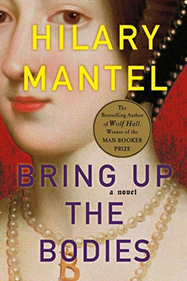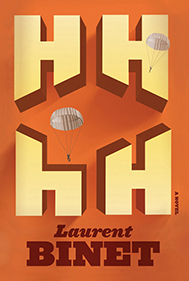by David Abrams
Buy on NOOK »-
March 15, 2013
Opening Round
-
Hilary Mantel
1Bring Up the Bodies
v.
4HHhHLaurent Binet
-
Judged by
Jack Hitt
In Ron Rosenbaum’s Explaining Hitler, he tells a stunning anecdote about the noted director of Shoah, Claude Lanzmann, trying to silence an Auschwitz survivor who would be speaking about Hitler. Lanzmann, who once gave a talk called “The Obscenity of Understanding,” believed that any attempt to explain pure evil was to belittle its horror.
It’s a thought-provoking idea, sort of the opposite of the rabbinical acknowledgement that even thinking the name of God is an act of arrogance, and so always spelling Y*HW*H without all the letters. Describing evil, Lanzmann was saying, required a comparably dangerous kind of hubris.
You can feel that hesitation in every sentence of Laurent Binet’s novel, HHhH. The plot tells the story of the successful effort by two parachutists in the Czech resistance in World War II to assassinate the Third Reich’s most efficiently lethal functionary, the much-nicknamed man known as the “Young Evil God of Death,” the bureaucrat in charge of the Final Solution—Himmler’s right hand man, Reinhard Heydrich. Binet’s title is a German abbreviation of this latter claim.
The basic outline of the story has all the elements of a true-life thriller and, when it happened early on in the war, in 1942, the assassination became the first great blow against the Nazi war with the world. The book is described as historical fiction, although from the very beginning, there’s a clear sense that the narrator (who may or may not be Binet) is struggling to get past the facts of history, which are scattered throughout the book like so many term-paper index cards, constantly being held up for the reader to regard as possibly true. Or not.
For instance, the assassins manage to get a grenade to blow up the side door of the Mercedes, causing the shrapnel wounds that will eventually kill Heydrich. There are several riffs in the book devoted to whether the Mercedes was black or green. There is a photo, the manic narrator tells us, but it’s in black and white. And the replica found in a Czech museum is black but there are rumors that it could have been a dark green. Binet’s narrator worries mightily about this, finally resolving nothing and adding, “Anyway, I’m probably attaching too much importance to what is, at the end of the day, just a background detail. I know that. In fact it’s a classic symptom of neurosis. I must be anal-retentive. Let’s move on…”
The tone of the narrator’s offstage whispers comes off, eventually, as stiffly posed, and can range from querulous to snarking to twee. They are like those imitators of David Foster Wallace who riddle their story with sardonic footnotes, full of winking ironies; after a while, it just seems like a whole lot of winking. Sometimes the narrator can sound like a sophomore in a lit class: “Sometimes I feel like a character in a Borges story.”
Even the weedy issues of how to tell the story persistently emerge amid its shards. At one point, the narrator reads a novel related to his story and marvels at a blunt transition sentence that reads, “1920 had just begun.” The narrator adds, “I think that’s brilliant.” A few pages later, a riff on Heydrich’s early life ends, “It is November 9, 1918.”
Whether the narrator can attain the momentum to get past the Lanzmann caution and tell us a story is more often the source of suspense in HHhH than the covert op to kill the Butcher of Prague.
I know, I know, these little squalls of uncertainty are postmodern meta-cris de coeur, pulling back the veil of historical fiction and revealing the grubby con game that lies at the heart of nonfiction, which ultimately is meant to make us do the work of constructing the historical fiction in our own heads. We become the authors, in a sense, of the historical novel. Yeah, I get that.
But in the guts of this story is a breathtaking thriller and we never get to be simply seized by the details of it. The ferocious Nazi known as the “Blond Beast” is driving to work one June morning in an open-air Mercedes sedan because Heydrich thought he was invincible and that the Czech people loved him. His driver comes to a hairpin curve and is forced to slow down. At which point, two resistance fighters, one Slovak and one Czech, who had parachuted in weeks earlier from London, leap out at the car. Let’s name these men: Jozef Gabčík and Jan Kubiš. One jumps out and begins firing a machine gun right at Heydrich, but the machine gun jams. Not a single bullet fires. Heydrich and his driver draw their weapons and begin firing. Meanwhile, the other parachutist tosses a bomb and blows bits of the Mercedes into Heydrich, such that later surgeons will be removing horsehair upholstery from his Nazi flesh (a series of procedures that ultimately fail), and, septic, the man known as The Hangman dies. Meanwhile, the two parachutists miraculously escape, and Hitler, enraged, suspects the village of Lidice of complicity. In a single day, the men of Lidice are exterminated and the others deported to camps (including four pregnant women who are forced to have abortions and then sent on). The village is burned to the ground. Lidice becomes a shibboleth for the rest of the world, the single word that first served as the vessel of all Nazi evil. The two escapees are eventually found hiding in a church crypt. Trapped, they kill themselves.
It’s as close to a true heroic epic as there ever could be, and yet the snarky rhetorical apostrophes about history are, finally, frustrating, because some part of any reader yearns to be seduced by story. Early on in the novel, you begin to feel like you’ve crawled in bed with a beautiful but chatty mistress who is constantly asking about your needs and what do you like and is this good for you, so that you just want to tell her to “shut up and fuck me already.”
In this way, Hilary Mantel is Mae West. With Bring Up the Bodies, she’s luring you in from the first sentence: “His children are falling from the sky.” Soon enough, we learn that these children are the battling, wounded falcons belonging to the regal minister, Thomas Cromwell. “All summer has been like this, a riot of dismemberment, fur and feather flying…” The images of predators, bloodied from conflict, coming home to roost, transports us, with its spell, back to 1535 and Henry VIII’s court when the king is beheading wives, slaughtering Catholics, overbooking the Tower of London, founding a church, and planning some future wars. It’s a time when Henry was obsessed with his own (non-existent) children and with the many things that would soon plunge to the ground like falcons in a helpless stoop. The mise en scene is historically familiar and turns on the life of this other, efficient bureaucrat, Henry’s evil hatchet man: Cromwell.
Also like Binet, Mantel obsesses on the details of history, but who can care if she’s accurate in the strict journalistic sense when she can shape a sentence like this one, a description of Anne’s father: “He is not a man wedded to action, Boleyn, but rather a man who stands by, smirking and stroking his beard; he thinks he looks enigmatic, but instead he looks as if he's pleasuring himself”? Ooooh, baby, baby, what a sentence. As Binet would say, “I think that’s brilliant”—and that’s not just my meta-anal retention talking.
At one point, Cromwell is speaking to Anne’s brother, whom he will be maneuvering into a charge of incest and ultimately dooming to death. Cromwell can’t help but notice how nice all his clothes look. Mantel indulges in some easy symbolism, having Cromwell observe that Boleyn “wears white velvet over red silk, scarlet rippling from each gash.” Nice, but Mantel lets the image bloom in your head, a time-lapse of layered metaphor. Suddenly, Cromwell recalls the image of a “saint being flayed alive” that he once saw. “The skin of the man’s calves was folded neatly over his ankles, like soft boots…”
Did Cromwell really think this way? Did men of standing actually wear velvet fringe in the 16th century? Is there really a martyr flayed in this way? It’s hard to ask those questions when Mantel seduces you into a moment like that one. With any piece of historical fiction, one is always living both inside and outside the details that are left to us by official chronicles, handed-down memories, the detritus of the time, and oral legends—struggling to balance this and that and the other thing and then to write.
When Cromwell is musing on the ambitious bishop of Winchester, Mantel writes, “When Stephen comes into a room, the furnishings shrink from him. Chairs scuttle backwards. Joint-stools flatten themselves like pissing bitches.”
Marry me.
Match Commentary
By Kevin Guilfoile & John Warner
Kevin: When you read these books back to back, as it happens I did, you really do feel them in conversation with one another. Binet is telling a true story, but he’s ambivalent about the telling of it. Mantel, on the other hand, relishes both her subject and the form of the historical novel. Like Judge Hitt, I feel like Mantel dominates the debate.
Which isn’t to say I didn’t enjoy HHhH. I tore through it in just a few sittings, in large part because the story of Heydrich’s assassination is extremely compelling. In American schools you only study the parts of world history that involved the U.S., so I knew very little about it. So my position with regard to this book—in which Binet describes the assassination in the manner of a solid college lecturer with interludes describing his angst about inserting even the smallest fictional details—is one that I hate to be in. I think the unfairest kind of criticism is to pile on an author for not writing a different book. But there’s no getting around the fact that while I was reading HHhH, what I wanted to be reading was a rollicking good novel about the same subject.
Which I guess is the effect Binet is going for. He wants you to be aware of the great distance that exists between “historical” and “fiction” by creating that very tension in your brain. But don’t we already have this debate every time someone exaggerates in a memoir? It seems to me that this is less a novel and more a work of literary criticism. And if I reclassify it that way, I would tell you it’s the most exciting and readable piece of literary criticism I’ve ever read. If we had a Tournament of Literary Criticism, I would give HHhH the Rooster right now. And what would we call that award? The Edmund B? The Foucaultster? The Derriduck?
Adding to the unfairness of it all, Hilary Mantel is just a master. She has to be the best practitioner in this genre in a very long while. For me, Binet’s argument carries little weight against her counterexample. It’s just so good. So much fun to read. Yes, it’s far more fiction than history, but give me more of it.
Tom Wolfe had a novel this year, as well. It didn’t make the ToB, but he probably should be part of this conversation. Wolfe believes that future generations will learn more about our time from our fiction than they will from our history books, and so he believes novelists have an obligation to be more like reporters when describing our present. In a way he’s making Binet-like case. Write historical fiction about our time now, because our grandchildren will never get it right.
John: I am a little ashamed to admit this, particularly considering yours and Judge Hitt’s and the rest of the reading world’s endorsements, but Bring up the Bodies is one of only two entrants in this year’s Tournament that I didn’t at least sample, let alone read in its entirety.
My resistance to picking up the book is inexplicable even to me. I read Wolf Hall with pleasure previously. My admiration for Mantel’s talent and skill knows no bounds. She’s in the midst of a Hall of Fame career. It’s like turning down free tickets to a ’90s-era Bulls game.
Though, you invoking Wolfe maybe sheds a little light on where I’m coming from. Wolfe’s cri de coeur from the November 1989 Harper’s “Stalking the Billion-Footed Beast” had a pretty significant impact on a college sophomore starting to dip his toes into writing creatively. I’d written my high school English term paper on Wolfe (in a New Journalistic style to boot), so I was a fan, and when I read the Harper’s essay, I just remember being convinced that he was right.
Some of that was due to the fact that I was young, and my critical sensibilities were as limited as a Real Housewives of Beverly Hills cast member’s facial expressions. The intervening years have tempered my admiration, as I don’t particularly ascribe to Wolfe’s brand of “realism,” but what most interests me about the books I read, as well as the ones I’m trying to write, is what they show me about our present history.
I can’t say that I would’ve picked HHhH in this matchup because I’m not positioned to make the comparison, but I enjoyed the tension that our hand-wringing authorial presence brought to the work. It makes the history “matter” in a way that historical fiction never does for me. I’d set my TiVo for a rip-roaring straight ahead documentary on Heydrich’s assassination, but I was pleased with the way Binet revealed some of our world as he wrestled with the past.
To me, that wrestling is a necessary part of the story. It’s possible that I’m falling prey to the imitative fallacy, that the frustration the reader feels isn’t a vital part of the experience, and is instead, just frustration, but HHhH is one of those books that I wouldn’t have read if not for the Tournament, and I’m glad it got on my radar.
Kevin: But aren’t the truths of Bring Up the Bodies (I know you have haven’t read it, but they apply to Wolf Hall, as well) about power and sex and religion and corruption and ambition as present as anything in HHhH? I don’t doubt that I’m missing much here, but it seems to me that Binet is merely bringing the limits of nonfiction and applying them to fiction. The result isn’t terrible, but I just don’t see the point.
I recently had a drink with the outstanding biographer (and former ToB judge) Jonathan Eig (Opening Day, Get Capone). Jon has been writing a novel and he was telling me how difficult it had been at first to give himself permission to make things up. I told him I had the opposite problem when I sat down to write a memoir—that I had to constantly resist the temptation to explain why these real people, as opposed to characters in my novels, had done the things they had done.
Fiction was invented to explore the question that is almost always unknowable in fact—why? Binet deliberately cuts that hamstring in HHhH, and it’s a little bit interesting watching him limp along like that. I guess it would also be interesting to watch a carpenter try to build a house without nails, but after a while I would wonder why he doesn’t just go to the hardware store.
John: While I see that the themes of Bring Up the Bodies have an eternal saliency, I think, for me, it’s not the themes in books that are all that interesting to me. I’m not a big “what does this book mean?” reader. I’m more interested the hows and the whys. There’s some part of my readerly self that enjoys seeing the novelist’s work on the page sometimes, rather than hidden behind the scenes. I like that Binet offers as many questions as answers in confronting his material. It’s how I tend to think of the things I write about. I’m sure some of my interest in this approach centers around my specific preoccupations in thinking about how novels “work,” though, which makes me a pretty narrow audience.
Kevin: We’ll wrap up the opening round on Monday when Lauren Groff’s Arcadia takes on Sheila Heti’s How Should a Person Be? in a contest judged by D.T. Max. We’ll also find out which of our favorite losers from the first eight matches still have a chance at second life, as we take our first peek at the Zombie contenders. Finally, we’ll have a contest to announce, with a very nice prize, and you’ll only have 24 hours to enter. Don’t miss out.
























